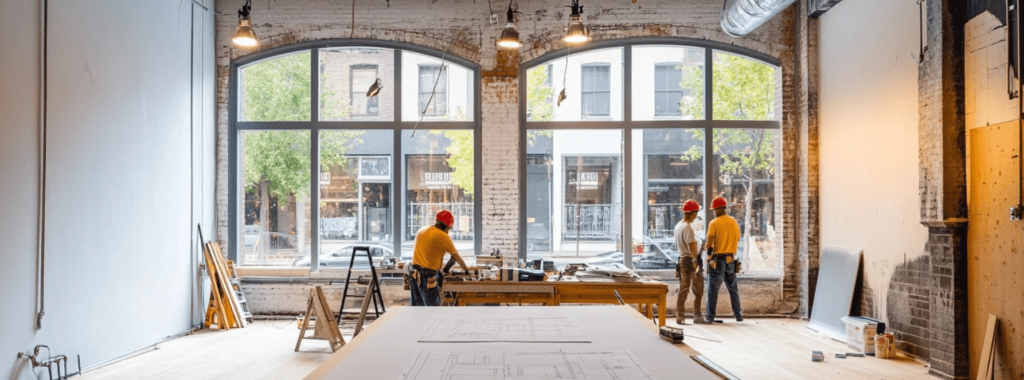The challenge of underutilized or empty office spaces has become increasingly prominent as the remote working movement slows, and the RTO (return to office) movement grows. Even so, remote work has transformed how companies work and will always be around now that we have a taste for it.
This means that there are many business owners and asset managers that are now in charge of commercial real estate that is largely empty. These spaces represent untapped potential that, with the right strategy, can be transformed into valuable assets. Not all businesses need a physical location, and that’s ok. The key lies in identifying innovative and sustainable ways to repurpose these areas to meet current market demands and generate revenue.
The Potential of Empty Office Spaces
Empty office spaces are more than just vacant rooms; they are opportunities waiting to be seized. In urban and suburban areas alike, these spaces can be repurposed to serve new, dynamic purposes that benefit not only the property owners but also the community at large. From coworking spaces that cater to freelancers and startups, to creative studios, pop-up stores, and event venues, the possibilities are as diverse as they are lucrative. Repurposing office space not only provides a financial return but can also contribute to the vibrancy and economic health of the surrounding area. By thinking creatively about the use of space, business owners and asset managers can unlock new revenue streams and increase the value of their properties.
The table below will help in quickly assessing each idea based on two critical factors: the ease of implementation and the associated costs. Understanding these aspects can aid business owners and asset managers in making informed decisions that align with their capabilities and investment strategies.
| Idea | Ease | Cost |
|---|---|---|
| Coworking Space | Medium | $$ |
| Event Venues | Low | $$$ |
| Art Galleries or Studios | High | $ |
| Pop-up Retail Stores | Medium | $$ |
| Fitness Centers or Yoga Studios | Medium | $$$ |
| Incubators or Accelerators | High | $$$ |
| Educational Classes or Workshops | Low | $ |
| Storage Solutions | High | $$ |
Ease:
- Low: Requires minimal effort or adjustment to the existing space.
- Medium: Some modifications or marketing efforts are necessary.
- High: Significant alterations to the space or extensive marketing and management efforts are needed.
Cost:
- $: Low investment required; minimal renovations or additions needed.
- $$: Moderate investment; some renovations and operational costs involved.
- $$$: High investment; significant renovations, high operational costs, or expensive equipment necessary.
Business Ideas Overview
- Coworking Spaces: Capitalize on the growing freelance and remote work trend by offering flexible office solutions. The advantages of hot desking, networking, and flexible contracts are very appealing to many people. Requires moderate investment in furniture and amenities, with potential for high returns through membership fees.
- Event Venues: Transforming office space into a venue for events, workshops, or conferences can attract a diverse clientele. This idea requires a low level of modification but a higher investment in marketing and amenities to stand out.
- Art Galleries or Studios: Offering space to artists can foster community engagement and cultural enrichment with minimal investment. This idea ranks high in ease due to the low need for structural changes and operational simplicity.
- Pop-up Retail Stores: Short-term leases to retail businesses can generate buzz and attract foot traffic, requiring moderate investment in flexible, modular setups.
- Fitness Centers or Yoga Studios: With health and wellness trends on the rise, converting office space into a fitness center can appeal to a broad audience. This requires a moderate level of effort in terms of renovation and a higher cost for equipment and branding.
- Incubators or Accelerators: Supporting startups by providing space and resources can be highly rewarding but requires a significant investment in mentorship programs and networking opportunities.
- Educational Classes or Workshops: Utilizing space for education, from tech workshops to art classes, requires low modification and can be a steady source of income with minimal investment.
- Storage Solutions: Offering secure storage options can be a high-ease, moderate-cost solution, especially in urban areas where space is at a premium. This requires investment in security and climate control systems.
Considerations Before Repurposing
Before diving into the transformation of empty office spaces into new ventures, several key considerations must be taken into account to ensure the success and sustainability of the project. These considerations are crucial for aligning the business idea with legal requirements, market demands, and strategic goals.
- Legal and Zoning Considerations: It’s essential to understand the local laws and zoning regulations that apply to your property. Some repurposing ideas may require special permits or fall under specific zoning restrictions. Ensuring compliance from the outset can save time and prevent legal issues down the line.
- Market Demand and Target Audience: Researching the local market and identifying a target audience are critical steps. Understanding the needs and preferences of the community can guide the selection of the most viable business idea. It’s also important to assess the competition and market saturation to ensure there’s a demand for the new venture.
- Long-term vs. Short-term Repurposing Strategies: Consider whether the repurposing idea is a short-term solution or a long-term investment. Some concepts, like pop-up retail stores, may offer quick returns but lack the stability of long-term ventures like co-working spaces or educational facilities. Balancing the immediate financial needs with long-term strategic goals is crucial.
- Financial Feasibility and Return on Investment: Analyzing the cost implications and potential revenue of the repurposing project is vital. This includes not only the initial investment but also ongoing operational costs. A detailed financial plan (and maybe even a construction lawyer) can help in assessing the feasibility of the project and its potential return on investment.

Conclusion
The challenge of empty office spaces, while daunting, presents a unique opportunity for business owners and asset managers to innovate and diversify their portfolios. With the right approach, empty office spaces can become more than just vacant areas; they can turn into sources of revenue, innovation, and community engagement.



